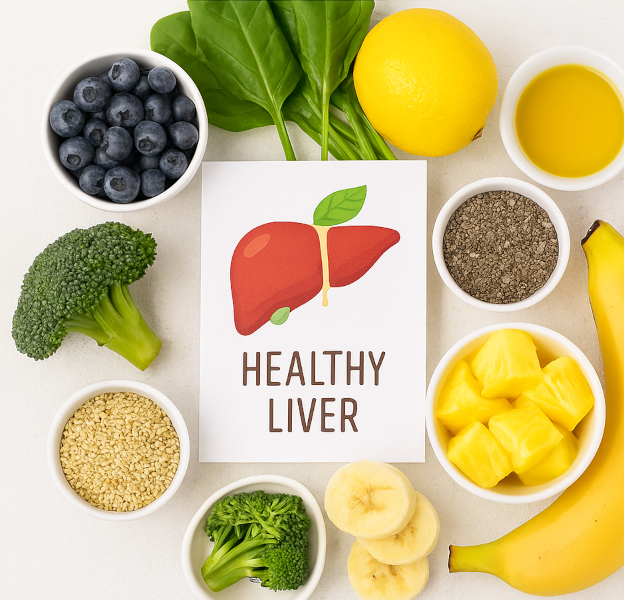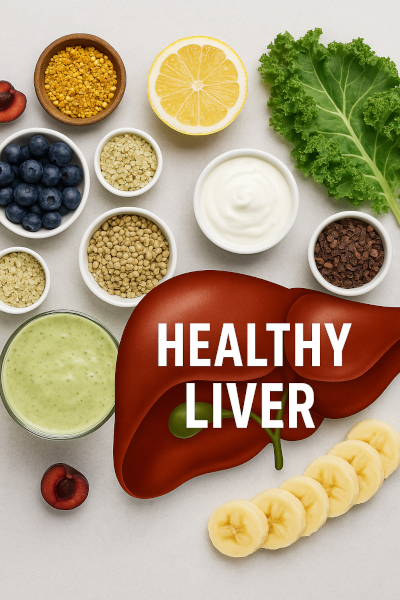Sluggish Liver After 60?
If you’re over 60 and struggling with unexplained weight gain, bloating, or low energy, your liver may need extra support. Learn the signs of a sluggish or fatty liver, common causes, and how I’m tackling it with a gentle, plant-forward reset you can try too.

Sluggish Liver After 60? Causes, Symptoms, and My Gentle Reset Plan
A sluggish liver after 60 can lead to weight gain, bloating, fatigue, and hormonal imbalance. Common causes include hormonal shifts after menopause, poor diet quality, low activity, and digestive issues. Symptoms may be subtle but often involve midsection weight gain, fullness after meals, and reduced energy. Supporting the liver with nutrient-rich, anti-inflammatory foods, regular movement, and gut-friendly habits can help restore function.
When Your Liver Slows Down: My Personal Wake-Up Call After 60
For most of my life, I thought of the liver as an under-the-radar organ — quietly managing toxins, nutrients, and hormones in the background. But over time, especially after age 60, this quiet workhorse can start to slow down.
I’m 61, post-menopausal since age 42, and I’ve always worked to take care of myself — eating a mostly plant-based flexitarian diet, exercising three times a week, and staying active with full-time work and several side hustles. I haven’t had a cold or any illness that’s kept me bedridden in over four years, just the occasional allergen flare-up from the dry desert air where we live.
Still, over the past few months, I noticed something was off. Despite keeping my routine consistent and even eating fewer meals, I’ve gained several pounds. I also feel more bloated, and my midsection seems to hold onto fullness after eating. That’s when I started thinking seriously about my liver — and whether I might be dealing with a sluggish liver or early-stage fatty liver.
When Sluggish or Fatty Liver Often Appears After 60
Liver changes can happen quietly for years before you notice them. For some, early signs show up in their 40s or 50s. For others, it’s not until their 60s, when metabolism slows, hormone balance shifts, and decades of habits start showing up in energy, digestion, and lab work.
A “sluggish liver” isn’t a medical diagnosis, but it describes when your liver isn’t processing fats, toxins, and hormones as efficiently. Fatty liver disease, on the other hand, means there’s excess fat inside liver cells, which can lead to inflammation and scarring if untreated.
Common Causes After Age 60
- Hormonal changes after menopause
- Dietary patterns higher in refined carbs or processed foods over the years
- Alcohol use, even at moderate levels
- Low physical activity or prolonged sitting
- Certain medications that become harder to metabolize with age
- Weight gain around the midsection
- Digestive imbalances like IBS, which add to liver workload
Possible Symptoms & Early Signs
Many people don’t notice symptoms early on. When they do appear, they can include:
- Unexplained weight gain (especially in the midsection)
- Persistent bloating or feeling overly full after small meals
- Lower energy or mental fog
- Increased sensitivity to certain foods
- Hormonal shifts or mood changes
- Mild right-side discomfort below the ribs
Risk Factors to Watch For
- Being post-menopausal
- Family history of liver conditions
- Overweight or insulin resistance
- Alcohol intake over time
- High triglycerides or cholesterol
- Chronic gut issues
My Personal Turning Point
When I realized my body was changing despite keeping my healthy routines, I knew I didn’t want to wait until my next checkup to do something. I started researching ways to support the liver naturally — not a harsh cleanse, but a gentle reset using whole, anti-inflammatory foods.
That’s how I created my Liver Reset Plans — two versions that fit perfectly with my mostly plant-based flexitarian lifestyle. They’re built around:
- Cruciferous veggies and greens to activate detox enzymes
- Lean protein from fish, eggs, and plant sources
- Healthy fats for hormone balance
- Fiber-rich foods for gut health
- IBS-friendly starches like polenta, millet, sweet potato, and spaghetti squash
I’ll be starting this reset myself — and sharing my progress along the way. If you’ve been feeling “off” with unexplained bloating, fullness, or weight gain, this plan might be a gentle, realistic first step for you too.

Why I’m Sharing This Journey
I believe that when we work on our health together, we’re more likely to stay committed and see results. I’ll be documenting my progress — weight changes, bloating, energy levels — and sharing updates along the way. If you’ve been feeling like your body is holding onto “mystery weight” or that your digestion isn’t what it used to be, this reset could be a gentle, realistic starting point.
Want a simple way to put this into action? I’ve created a free Sluggish Liver After 60: Support Guide & Checklist to help you get started right away. It includes quick facts about sluggish and fatty liver, a liver-friendly foods checklist, easy lifestyle habits to follow, and a progress tracker so you can monitor your results week by week. Just download it below and keep it handy as your daily reference — it’s a practical companion to the plan I’ve shared here.
References
- Mayo Clinic – Fatty liver disease – https://www.mayoclinic.org/diseases-conditions/fatty-liver-disease
- Cleveland Clinic – Nonalcoholic Fatty Liver Disease – https://my.clevelandclinic.org/health/diseases/15831-fatty-liver-disease
- Johns Hopkins Medicine – Fatty Liver Disease – https://www.hopkinsmedicine.org/health/conditions-and-diseases/fatty-liver-disease
- National Institute of Diabetes and Digestive and Kidney Diseases – NAFLD & NASH – https://www.niddk.nih.gov/health-information/liver-disease/nafld-nash
- National Library of Medicine – The Effect of Menopause on the Liver – https://pubmed.ncbi.nlm.nih.gov/26773025/
- Harvard T.H. Chan School of Public Health – Carbohydrates and Blood Sugar – https://www.hsph.harvard.edu/nutritionsource/carbohydrates/
- American Liver Foundation – Alcohol and Liver Disease – https://liverfoundation.org/
- NIH – Sedentary Behavior and Health Risks – https://www.ncbi.nlm.nih.gov/pmc/articles/PMC3404815/
- FDA – Medications and the Liver – https://www.fda.gov/consumers/consumer-updates/medications-and-liver
- CDC – Obesity and Health Risks – https://www.cdc.gov/obesity/basics/index.html
- Johns Hopkins Medicine – Digestive Disorders and the Liver – https://www.hopkinsmedicine.org/gastroenterology_hepatology
Additional Reading & Video Resources
Articles:
- “How to Reverse Fatty Liver” – Dr. Axe – https://draxe.com/nutrition/fatty-liver-diet/
- “10 Best Foods for Your Liver” – Healthline – https://www.healthline.com/nutrition/11-foods-for-your-liver
Videos:
- Fatty Liver: What to Eat & What to Avoid – Nutrition with Judy – https://www.youtube.com/watch?v=w2nUoXjqhXw
- Signs and Symptoms of a Sluggish Liver – Dr. Eric Berg – https://www.youtube.com/watch?v=wCPQ0Mdl3t4
- NAFLD Explained – Mayo Clinic – https://www.youtube.com/watch?v=9a8ObOtdOFA
Disclaimer:
This content is for informational purposes only and is not intended as medical advice. Always consult your healthcare provider before making any changes to your diet, supplements, or lifestyle—especially if you have existing conditions or take medication.
💌 Haven’t joined the Plant Based Flex blog yet?
It’s completely free, and when you confirm your email, I’ll send you my 7-Day Kickstart Wellness Bundle to help you start thriving beyond 60.
